Thai king's death: Who holds power now?
- Published
What does King Bhumibol's death mean for Thailand?
Much about the death of King Bhumibol has been as expected. Thailand has been consumed in grief for the loss of a beloved ruler.
But the decision to delay anointing his son and designated heir, Crown Prince Vajiralongkorn, as the next king has caught people by surprise.
On the night of 13 October, members of the military-appointed National Legislative Assembly were summoned to a special session two hours after King Bhumibol's death was announced, and they expected they would go through the formality of inviting the crown prince to take the throne.
But, following a meeting between him and Prime Minister Prayuth Chan-ocha, they were told the name of the next king would not be forwarded to them yet. Instead they held a nine-minute silent tribute to the late king, and went home.
Normally the succession should take place immediately after the death of the monarch. On 9 June 1946, for example, King Bhumibol was formally invited to take the throne in a night-time session of parliament, even though this was the same day his elder brother Ananda had been found mysteriously shot dead in his bedroom.
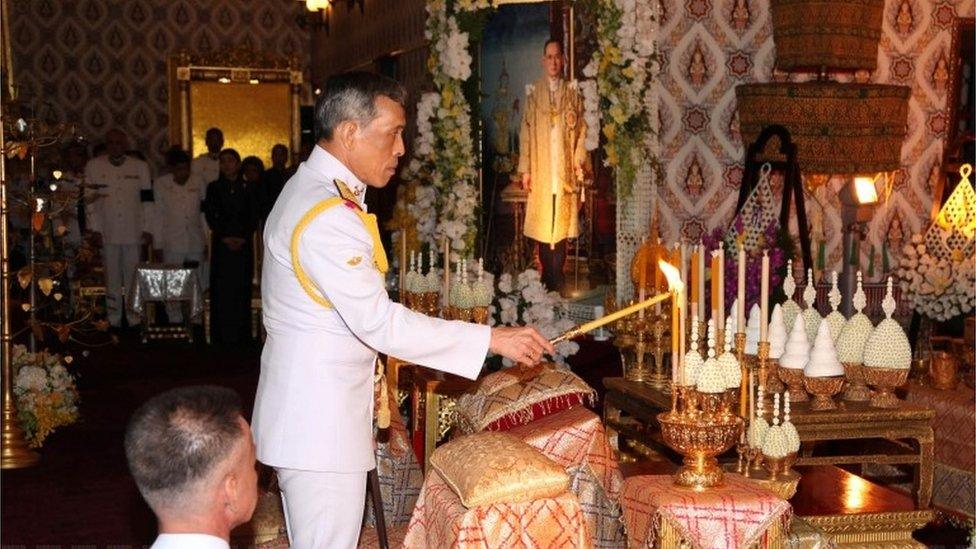
Crown Prince Vajiralongkorn is heir, but when will he be king?
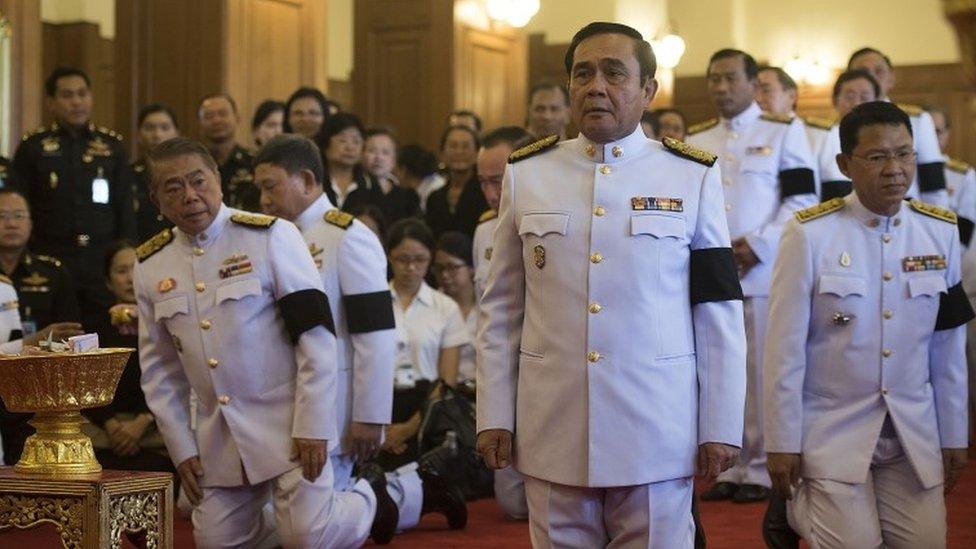
Thai PM Gen Prayuth Chan-ocha (centre) has sought to allay any worries about the succession
The young king was unprepared, but accepted, and then went back to Switzerland to continue studying for four years before returning for his coronation. Throughout that time, though, he was officially the king.
The government says the crown prince wants time to mourn his father with the Thai people before taking the throne. It isn't clear yet when that will happen, although the government's legal expert, Deputy Prime Minister Wissanu Krea-Ngam has stressed that it could be at any time, when the crown prince feels ready.
Mr Wissanu has also said that the crown prince does not want his coronation to take place until after a one-year official mourning period is over, and his father's remains have been cremated.
So who has real power in Thailand, now that King Bhumibol has gone?
His was on paper only limited, constitutional power, to advise and to be consulted. But in practice the huge popularity he acquired over his long reign gave him great influence - his word, or his preferences, could change policy, or even governments.
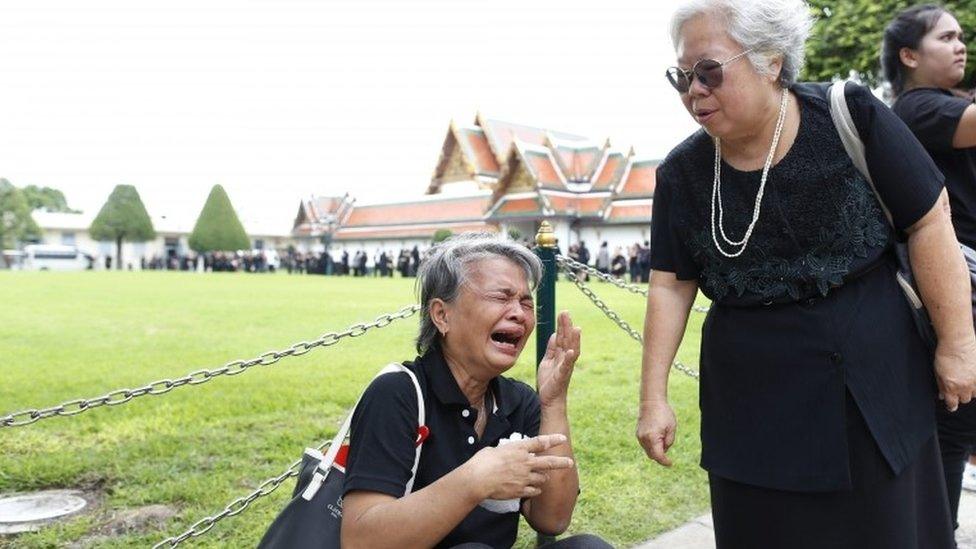
Ordinary Thais feel a keen sense of loss
In May 1992, for example, he is credited with ending a bloody stand-off on the streets between the army and pro-democracy demonstrators simply by summoning and scolding the military-backed prime minister, who went into exile, and the protest leader.
In April 2006, King Bhumibol broke another political stalemate by suggesting a boycotted election, won by then-Prime Minister Thaksin Shinawatra, should be annulled. It was.
Real power
With no king yet formally anointed, his powers are exercised by a regent, who, under the constitution, is the chairman of the king's privy council.
He is 96-year-old Prem Tinsulanonda, one of the late king's closest and most influential advisers, who has in the past expressed reservations about the crown prince's capabilities.
As regent, he will carry out important duties like endorsing the new, military-drafted constitution, which must be done within a month. However, the BBC understands that he will exercise those powers in close consultation with the crown prince.
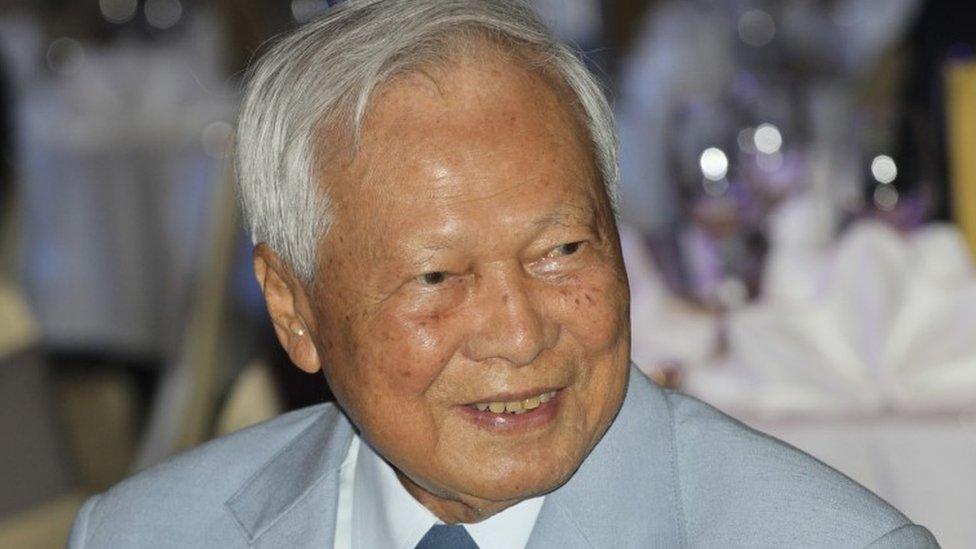
Regent: Prem Tinsulanonda, 96 and a former PM
But at the moment real power in Thailand still lies with the military junta that seized power two years ago. Many observers believe one of the principal reasons for the coup was to ensure that the ultra-royalist armed forces were in charge when the succession happened.
It was the long partnership between the military and King Bhumibol through much of his reign that restored the monarchy from a low point in its fortunes when he acceded in 1946, to the pinnacle of its prestige in the 1990s. The military sees its role primarily as guardian of the monarchy, and it is difficult to imagine any succession scenario in which it does not have an important say.
However, the generals are very loyal to King Bhumibol's wishes, and he never wavered from his belief that his son must inherit the throne. While the timeline is uncertain, the government has made it clear that Crown Prince Vajiralongkorn is the undisputed heir, and that he will eventually become king.
Prime Minister Prayuth Chan-ocha has assured the Thai people that the succession will follow tradition, and that it will go smoothly. He has told them them not to worry about when it will happen, but to unite in sharing happy memories of the late king.
That will not stop inevitable speculation over why the succession to so important an institution is being delayed. Like much else in Thailand's monarchy, there is still some mystery and ambiguity in this critical transition.
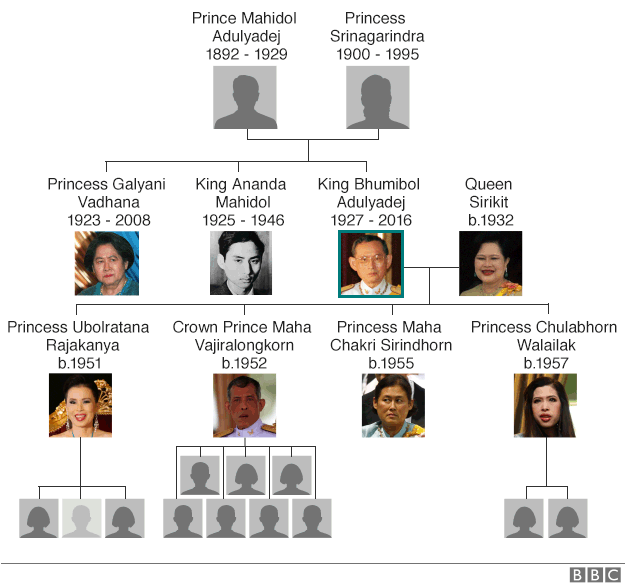
The royal family tree